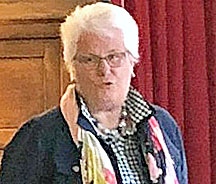
The Rotary Club of Karori hosted Barbara Mulligan of Karori last Tuesday evening, a former Port Nicholson Rotary Club member and a “one person champion” restorer of the graves of the 1918 Wellington flu victims in Karori cemetery.
Over the past year Barbara has been hard at work with the support of a few friends and volunteers preserving close on 700 graves of those who perished from the flu pandemic in a period of just over two months from mid- October to mid December 1918.
The so-called ‘Spanish’ influenza killed an estimated 50 million people world- wide. New Zealand lost nearly 9,000 people to influenza, about half as many New Zealand military deaths over four years in World War 1. The 1918 flu pandemic was the worst public health crisis New Zealand had seen. Barbara showed graphic pictures of graves that had suffered from years of neglect and the outcome of hard work to restore them. Many of these graves are in an area down on the eastern side of the cemetery with gum trees overhanging and where considerable damage has occurred over many years. The flu attacked and killed people who were in their prime of life, not just the very young or elderly. Housing conditions in the capital, places of work and being around people who carried and spread the virus made people very vulnerable and there were many deaths of working people in their 20s and 30s.
Karori Cemetery, owned and managed by the Wellington City Council, is one of the largest cemeteries in New Zealand, over 40 hectares containing some 85,000 interments. Barbara showed many slides especially of the servicemen’s section, where in a space of four weeks in late 1918 row upon row of victims of the flu pandemic were buried, many of them having come from the Trentham training camp which was heavily hit by flu in the latter stages of the war.
Barbara is hoping to encourage the formation of A Friends of Karori Cemetery to care about conservation, preservation and a full interpretation of this vast cemetery.
The restoration project led by Barbara culminates in a special Influenza Centennial Commemoration at Karori Cemetery on Sunday 18 November at 11am and again on Sunday 25 November with a public service in the Services section. Mayor Justin Lester and Wellington Central MP Hon Grant Robertson will give addresses and with the addition of an address by Professor Geoffrey Rice, author of two major publications about the Flu pandemic in New Zealand, ‘Black November (1988) and an updated version, Black Flu 1918: the story of New Zealand’s worst public health disaster, published last year.
Karori Rotary Club member, Henk Rood, gave a viewpoint following Barbara’s address with a focus on whether members of Rotary have perceived any advantages from moving to meeting only twice a month. Her said that on a recent make up meeting at Rotary on Cuba, a club which still meets weekly they were most interested in whether there had been gains from moving to only two meetings a month. He said the jury was still out on this question in his view.